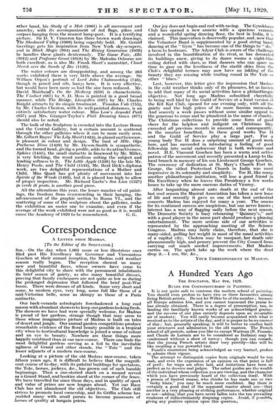A Hundred Years Ago
AINTING.
It is not quite safe to contemn the modern school of painting. You should even profess to have two or three favourites among living British artists. Do not let Wilkie be of the number ; because all Europe admires him, and you cannot transcend the praise he has already obtained. There is a degree of presumption, too, in lauding the familiarly known works of an acknowledged' genius ; and the success of our plan entirely depends upon an 'invariable air of modesty. You will easily become acquainted with what is received as to the artists of the day, and it is proper to be au courant of this ; but, generally speaking, it will be better to eonffne both your strictures and admiration to the old masters. The French school of all periods, unless you like to except Watteau (N. Poussin; and Claude de Lorrain are to be considered as Italians) may be condemned without a show of mercy ; though you- can remark, that the young French artists draw very prettily--:this will be like recalling a too powerful tint.
Fuzeli's enormities being acknowledged as very learned, profess to admire their vigour.
The attempt to distinguish copies from originals would be too rash, and even the expression of an opinion on that point is full of peril ; for traps are often laid, and imitations have been so perfect as to deceive real judges. The safest guides are the wealth Of the individual whose collection you are viewing, and the character which you have previously heard of the collection itself. With a person- of limited means, who thinks he has made one or two " lucky hints," you may be much more confident. Say there is certainly a good deal of the supposed master about orie—lhat another is a very pleasing or striking performanee, whether original or not—adding,- that you have never fallen into the too prevailing Weakness of indiscriminately despising copies, Avoid, if possible; giving any positive opinion upon this' qUeetion,










































 Previous page
Previous page